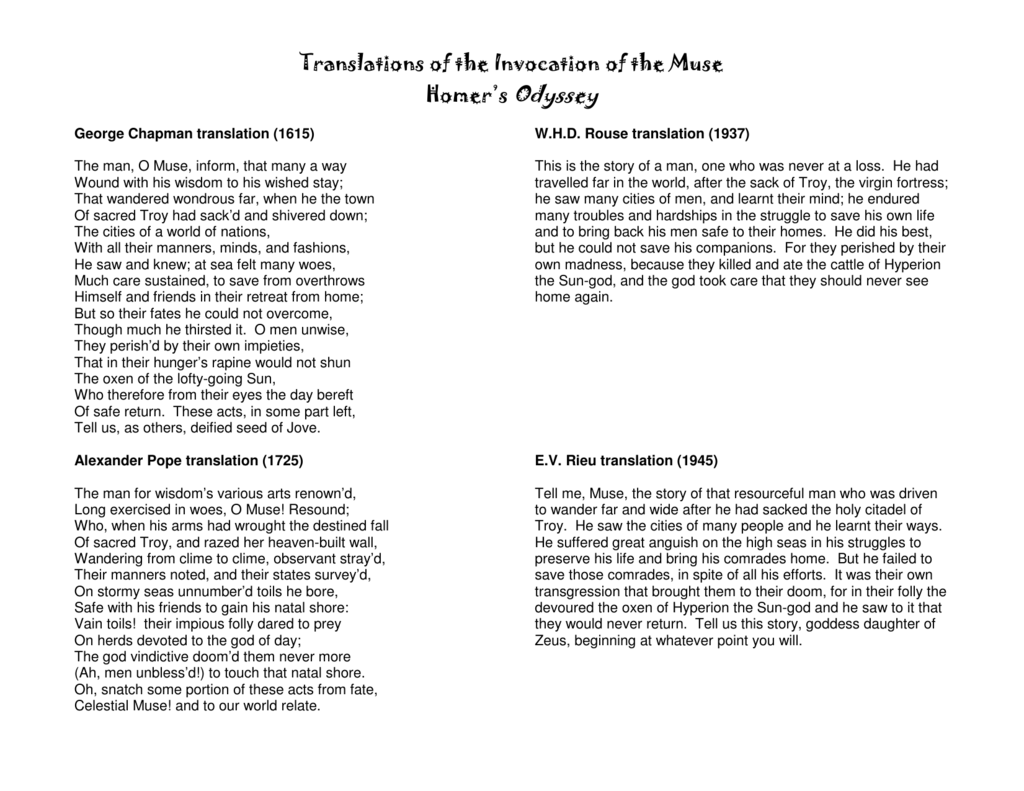

By "justify," Milton means more than simply to explain he means that he will demonstrate that God's actions in regard to man are just. Moreover, his intention will be to "justify the ways of God to men" (26) through the aid of "Eternal Providence" (25). He does add that his subject will include the "greater Man" (4) who saved all others from the original disobedience. Milton further emphasizes in the prologue that his theme will be Man's disobedience to God's will, implying not only Adam's disobedience, but all mankind from first to last. In these first lines, Milton thus draws on two traditions - the classical epic exemplified by Homer and Virgil and the Christian tradition embodied in the Bible as well as Dante's Divine Comedy and Edmund Spenser's The Faerie Queene. As the prologue continues, it becomes apparent that this muse is more than just the classical Urania, but also a Christian muse who resides on Mt. He calls her the "Heav'nly Muse" (7) and says that he will sing "Of Man's First Disobedience" (1), the story of Adam and Eve and their fall from grace. Milton begins Paradise Lost in the traditional epic manner with a prologue invoking the muse, in this case Urania, the Muse of Astronomy. When the work is done and the capital completed, they all assemble for the first great council. The devil army, flying this way and that, is compared to a great swarm of bees. Under the direction of their architect, Mulciber, they construct a great tower that comes to symbolize the capital of Hell, Pandemonium. They find mineral resources in the mountains of Hell and quickly begin to construct a city. This speech inspires the devil host, and under Mammon's direction, they immediately begin work on a capital city for their Hellish empire. He tells them that they still have power and that their purpose will be to oppose God, adding, "War then, War / Open or understood, must be resolv'd" (661-62).

This devil army is large and impressive but also aware of its recent ignominious defeat. These fallen angels think that they have escaped from their chains through their own power, but Milton makes it clear that God alone has allowed them to do this.

Each devil is introduced in a formal cataloguing of demons. As they come, Milton is able to list the major devils that now occupy Hell: Moloch, Chemos, Baalem, Ashtaroth, Astarte, Astoreth, Dagon, Rimmon, Osiris, Isis, Orus, Mammon, and Belial. From the plain, Satan calls the other fallen angels to join him, and one by one they rise from the lake and fly to their leader. He flies to a barren plain, followed by Beelzebub.
#An invocation of a muse free
With effort, Satan is able to free himself from his chains and rise from the fire. Still he adds that it is his intention to continue the struggle against God, saying, "Better to reign in Hell than serve in Heaven" (263). Satan comments on how Beelzebub has been transformed for the worse by the punishment of God. Next to Satan lies Beelzebub, Satan's second in command. Lying on the lake, Satan is described as gigantic he is compared to a Titan or the Leviathan. They were defeated and cast from Heaven into the fires of Hell.

Satan, who had been Lucifer, the greatest angel, and his compatriots warred against God. The poem thus commences in the middle of the story, as epics traditionally do. He concludes the prologue by saying he will attempt to justify God's ways to men.įollowing the prologue and invocation, Milton begins the epic with a description of Satan, lying on his back with the other rebellious angels, chained on a lake of fire. He also says that the poem will deal with man's disobedience toward God and the results of that disobedience. He invokes the classical Muse, Urania, but also refers to her as the "Heav'nly Muse," implying the Christian nature of this work. Book I of Paradise Lost begins with a prologue in which Milton performs the traditional epic task of invoking the Muse and stating his purpose.


 0 kommentar(er)
0 kommentar(er)
